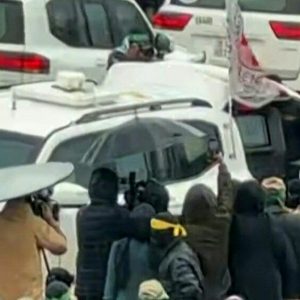Senegalese artists show support for Palestine with graffiti
DAKAR, Senegal (AA) – Graffiti artists are raising awareness in Senegal about the Israeli attacks in Palestine and Lebanon by painting messages of support on the walls of Dakar.
The Pan-African Graffiti Artists Collective (RBS) and the Anti-Apartheid African Artists group collaborated to create graffiti on the busiest street in the Ouakam neighborhood.
The drawings include Hanzala, the iconic character symbolizing Palestinian resistance; Leila Khaled, one of the symbols of the Palestinian resistance, depicted with a gun in her hand; Palestinian journalist Bisan Owda, who won an Emmy for her documentary “I am Bisan from Gaza and I am still alive,”; and prominent Palestinian writer and intellectual Ghassan Kanafani.
The graffiti includes messages and drawings that urge a boycott, alongside prominent figures related to the Palestinian cause.
– Standing with Palestine –
RBS President and graffiti artist Serigne Mansour Fall, also known as “Madzoo,” said that the drawings were completed in one day by 25 artists, with locals assisting.
Fall said as African artists, they aimed to reflect their stance on the Palestinian issue and raise awareness within the community.
He emphasized their sensitivity to political and geopolitical matters, noting that they closely follow the issues. While having a Pan-African vision, they fundamentally share an anti-imperialist stance.
Artists should be the voice of their communities and provide benefits, raising awareness and guiding when necessary, according to Fall.
He expressed their desire to be the voice of the Senegalese people, who have always stood by Palestine, stating that their goal was to show solidarity with the people of Palestine and Lebanon beyond political decisions.
– Concept of boycott is not yet understood –
Fall emphasized that communities in Africa often cannot closely follow international political developments, highlighting the important role artists play.
He pointed out that the significance of boycotts is not fully understood by society.
Fall noted an incident where people were surprised and questioned the meaning of graffiti depicting a soda bottle as a bomb. That demonstrated to him that the concept of boycott remains unclear; many were unaware that their purchases could finance a war.
Throughout the day of the project, they explained the importance of boycotts and discussed other aspects of the Palestinian resistance.
Their goal was to draw attention to events in Palestine and Lebanon, raise awareness and make the issue more visible and part of everyday life, he said.
Fall noted that they plan to implement other projects related to Palestine in the coming days.
– Historical friendship between Senegal, Palestine –
Senegal’s ties with Palestine date to the 1960s, following its independence from France.
The country’s first president, Leopold Sedar Senghor, known for his support of Palestinian independence, participated in a mediation mission in Israel on behalf of the Organization of African Unity alongside peers from Nigeria, Cameroon and Congo.
Since 1975, Senegal has continuously presided over the UN Committee on the Exercise of the Inalienable Rights of the Palestinian People.
Senegal was one of the first African countries to allow Palestine to open a diplomatic mission on its territory in 1989 and among the first to grant a diplomatic passport to former Palestinian President Yasser Arafat.
During Senghor’s presidency, Senegal severed all diplomatic relations with Israel after the 1973 Arab-Israeli War, maintaining that stance until 1992.










